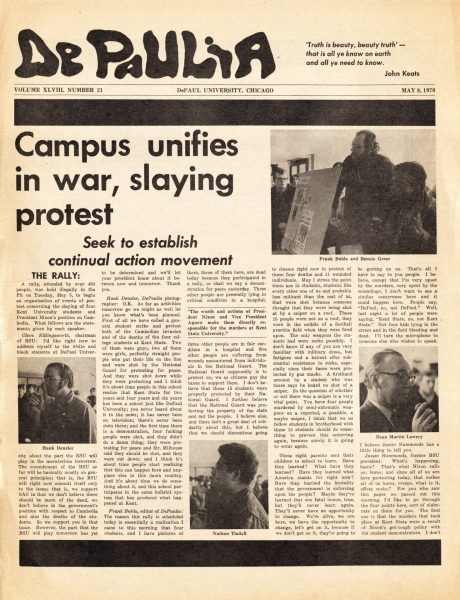DePaul’s speech and language clinic makes gender-affirming care accessible
DePaul’s newly opened Speech and Language Clinic is making gender-affirming care accessible for the community.
Voice is an important part of identity for many people. For transgender people, voice may contribute to feelings of gender dysphoria.
“Your voice is such an auditory representation of you that hearing it and knowing it doesn’t match you is a very intense feeling,” said Jane Koppitz, vice president of Spectrum, DePaul’s student LGBTQ+ organization.
DePaul’s Speech and Language Clinic, located in DePaul’s Lincoln Park Campus Welcome Center, is trying to help.
The clinic serves as hands-on experience for graduate students in DePaul’s Speech Language Pathology master’s program and provides services for a wide variety of communication, voice and swallowing disorders.
Voice is incredibly underlooked as an aspect of gender-affirming treatment, Koppitz said.
“A lot of trans folks, such as myself, view voice dysphoria as one of [the biggest], if not the biggest, hurdles to overcome,” she said.
There are many ways transgender and gender-nonconforming people can make their presentation congruent with their gender, such as hormone therapy, gender-affirming surgeries or simply clothes and makeup.
“But when it comes to voice dysphoria,” Koppitz said, “there’s not half as many resources out there.”
It administered voice therapy sessions to its very first clients just a few weeks ago.
The clinic’s gender-affirming voice therapy services make an important, often difficult-to-find resource more accessible.
Gender-affirming voice therapy helps transgender and gender nonconforming individuals “to align the sound of their voice with their gender identity,” said Ann Fennell, director of clinical education for the speech language pathology program.
Fennell oversees the graduate students who administer therapy at the clinic. She specializes in voice disorders and has worked in gender-affirming voice therapy for over 20 years.
“We ask individuals who come in what their goals are for their voice,” Fennell said. “We don’t assume that someone wants a super feminine sounding voice or a super masculine sounding voice, but what is it that they want to do with their voice that will help them with that alignment.”
Under Fennell’s supervision, graduate students coach clients on how to use their voice to make changes to the way it sounds little by little.
“To improve that perception of a more feminine voice we’re going to add in a higher pitch, higher intonation pattern and make sure the voice is very forward and resonant,” Fennell said.
This means making your voice more forward sounding and using an almost singsong way of speaking, raising their pitch on some words and sliding back down towards the end of a sentence.
“For trans men, we’re sort of doing the opposite,” she said. They flatten intonation to more of a monotone and lower the pitch.
Clients are given exercises to practice on their own, and depending on different factors, usually finish their voice therapy sessions after six to ten weeks. Fennell said the clinic is looking to expand treatment options to group therapy sessions, as well.
Many trans folks help coach each other to change their voice, but most people can’t find or aren’t aware of professional voice therapy services, Koppitz said. It’s also simply more difficult to change your voice compared to other aspects of gender presentation. While testosterone hormone therapy results in a change of vocal pitch, estrogen does not.
Additionally, health insurance doesn’t always cover gender-affirming care, and if it does, it may require an official diagnosis of gender dysphoria. And even with a diagnosis that can be difficult and expensive to obtain, insurance may not cover voice therapy.
DePaul’s Speech and Language Clinic is entirely donation-based, meaning there are no financial barriers to getting treatment, and clients can easily enroll regardless of a diagnosis.
“The great thing about our clinic being donation based is it makes our services accessible to everybody,” Fennell said.
Koppitz said she knows several people who have signed up for this service already and are excited.
Hannah Senanayaka, president of the National Student Speech Language Hearing Association at DePaul, works at the clinic’s front desk. She said students and faculty are just as excited to be providing this care.
“To see [the clinic] come to fruition and finally be able to start treating our clients is really special,” she said. “We’re filling a gap of need in the community for all sorts of therapy services.”
Most of the clinic’s clients come from referrals from other treatment centers, Senanayaka said, but the NSSLHA posts about the clinic’s services, including gender-affirming voice therapy, on their Instagram to help increase awareness of these valuable resources.
“I think there’s this collective community of care at DePaul where students want to share resources, so by posting it on our student page we knew that it would spread,” she said. “We want really any member of DePaul and the outside community to learn about these programs.”
To sign up for voice therapy services at the clinic, fill out a new client form on the clinic’s website.











